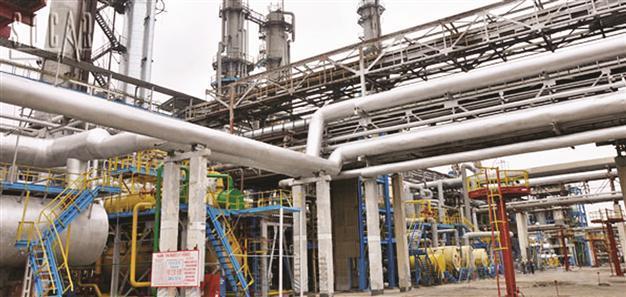Azeri pipeline to ‘help’ Turkey in talks with EU
Merve Erdil - ISTANBUL / Hürriyet

This photo shows a SOCAR facility in Azerbaijan. SOCAR owns an 80 pct stake in the TANAP pipeline, while Turkey’s Botaş owns a 15 pct stake and TPAO a 5 pct stake. Company photo
The Trans-Anatolia Pipeline (TANAP) project, which is set to send Azerbaijani natural gas to Turkey, could be a “game-changer” in Ankara’s accession talks with the European Union, according to an Azeri research center.“Turkey can achieve political gains with this pipeline; it can be an ace in terms of its EU membership negotiations. With the finalization of this project, Turkey will have a whole new position within the region,” said Gulmir Rzayeva, one of two analysts who wrote a report for SAM, a strategic research center sponsored by the Azerbaijani government.
Turkey was initially interested in the Nabucco pipeline, which is slated to carry natural gas from Azerbaijan’s Şahdeniz gas field to Europe via Turkey, Rzayeva said, but added that the pipeline was deemed to only serve the interests of the consumer nations, meaning Turkey, Azerbaijan and the Şahdeniz Consortium did not want to remain tied to the pipeline.
TANAP a game changer
“If we had chosen the Nabucco pipeline, we would all be tied to a European project. The Turkish and Azerbaijani governments acted wisely by starting their own pipeline. TANAP has completely changed the game,” she said.
According to the report, the TANAP pipeline will be very large and have the capacity to transport 60 billion cubic meters of natural gas.
Addressing speculation that the pipeline would cost $7 billion, she said: “This is not a definite number. It could be more than this or less than this. The pipeline will be built in three stages. It will start with 16 billion cubic meters, continue with 20 billion to 30 billion cubic meters and at the end reach 60 billion cubic meters. This is a long-term perspective. It will also allow for the connection to Central Asian gas.”
Rzayeva also said the pipeline was not in Russia and Iran’s interest. Iran, which had been charging Turkey $505 for a thousand cubic meters of gas, has upped the price to $585 since the TANAP agreement was signed in June. This adds an extra $800 million to Turkey’s energy bill per year.
TANAP is currently negotiating with both BP and Statoil for potential partnerships, Rzayeva said, adding that the TANAP Consortium’s headquarters would be based in the Netherlands in the interests of locating to a “neutral” location.
The TANAP pipeline will transport natural gas from Azerbaijan through Georgia and will be sold and forwarded through Turkey. The project’s first phase will see the sale of 6 billion cubic meters of the 16 billion cubic meters of natural gas via Turkey. The remaining 10 billion cubic meters will be transported to Europe. Pipeline construction is expected to begin in 2014 and finish in 2018.
The State Oil Company of Azerbaijan Republic (SOCAR) holds an 80 percent stake in TANAP, Turkey’s natural gas distributor Botaş holds a 15 percent stake, while Turkey’s national oil and gas company (TPAO) controls 5 percent. SOCAR wants to hold at least a 50 percent stake in the pipeline, but this may prove difficult if new partners come on board, according to the report.
















